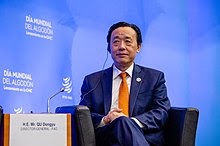23 June 2020. The European Green Deal: A Conversation on the Transformative Force of the EU Farm to Fork and Biodiversity Strategies to build Healthy and Sustainable Food Systems.
If we want to shift towards healthy and sustainable food systems and build back better after the COVID-19 pandemic, we need to re-connect agriculture with ecosystem services and unleash biodiversity's full potential to enhance our food and agriculture production, the participants of a high-level panel discussion, co-organised by FAO and the European Union.
The virtual discussion focused on ways to strengthen the FAO-EU collaboration on addressing challenges to sustainably manage biodiversity across all agricultural sectors.
The virtual discussion focused on ways to strengthen the FAO-EU collaboration on addressing challenges to sustainably manage biodiversity across all agricultural sectors.
"Biodiversity is vital to improving agricultural and food production and maintaining our planet's resources and ecosystems. More needs to be done to prevent the biodiversity loss undermining the resilience of many agricultural systems and posing a serious threat to global food security. Achieving sustainability at a global scale requires more than just technical and digital solutions. It involves key policy decisions, and in this regard the EU with European Green Deal just made a big step. The implementation of these important decisions in the field requires strong collaborative efforts between environment and agriculture sectors. We are ready to work together with all relevant key players including the environment sector; to accompany the changes across the entire food system, from environment to production up to consumption," FAO Director-General QU Dongyu
Recording forthcoming
Background: FAO-EU collaboration to mainstream biodiversity into agricultural sectors
- Opening Remarks: H.E. Ambassador Jan Tombiński, Permanent Representative to the UN Rome-Based Agencies, European Union
- Dr. QU Dongyu, - Director-General, FAO
- Farm to Fork Strategy - Ms. Sabine Juelicher, Director Food and Feed Safety, Directorate-General for Health and Food Safety, European Commission
- Link with the reform of the EU Common Agricultural Policy (CAP) - Mr. John Clarke, Director International Relations, Directorate-General for Agriculture, European Commission
- Biodiversity Strategy - Mr. Humberto Delgado Rosa, Director Natural Capital, Directorate-General for Environment, European Commission
- Global Dimension of the Strategies - Ms. Carla Montesi, Director Planet and Prosperity, Directorate-General for International Cooperation and Development, European Commission
- How FAO and EU can collaborate on the challenges to sustainably manage biodiversity across all sectors of the economy - Ms. Maria-Helena Semedo, Deputy Director General, FAO
- Closing Remarks - Ms Maria-Helena Semedo, Deputy Director-General, FAO
- Moderator - Mr Dan Leskien, Senior Liaison Officer, FAO
Background: FAO-EU collaboration to mainstream biodiversity into agricultural sectors
- Since 1991, the EU and FAO have collaborated through a substantial number of programmes in Africa, Asia, Europe, the Near East and Latin America. Between 2016 and 2019, the EU contributed more than USD 932 million to projects and programmes implemented by FAO.
- Thanks to the EU funding, FAO is currently supporting projects on the elimination of obsolete pesticide stockpiles and capacity development for improved pesticide management in Africa, for example.
- On forests, in the UN-REDD Programme, of which the EU is a founding member, FAO has supported more than sixty countries to halt deforestation, and while simultaneously addressing climate change, the preservation of biodiversity and safeguarding livelihoods.
- The Sustainable Wildlife Management (SWM) Programme, implemented by FAO and partners and funded by the EU in 13 countries aims to address both wildlife conservation and food security.
- The European Union also provided financial support to complement and strengthen the One Health approach, building on the existing Sustainable Wildlife Management Programme. The objective of this project will be to increase the understanding and assessment of the zoonotic risks along wild meat supply chains - from the forest to both rural and urban consumers. It will also assist countries to build their capacities to predict zoonotic risks and to set up measures to prevent and mitigate those risks and their consequences on public health, food systems and biodiversity.



No comments:
Post a Comment